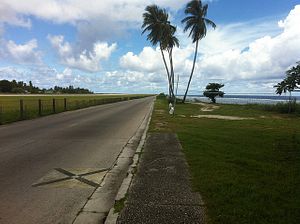The game of sovereign recognition is one that has been played with both cunning and chutzpah in the South Pacific for many decades. Without significant populations, resources, or geographic advantages, Pacific Island states have used their own recognized sovereignty within the international system of states as a leverage to play other states seeking recognition off against each other. The resulting favorable allocation of aid buys these Pacific Islands greater capabilities than they otherwise would have had.
The primary target of this game has been China. With most of the world shifting their recognition of China from the Republic of China (Taiwan – ROC) to the People’s Republic of China (PRC) in the 1970s, Pacific Island states saw a great opportunity to use this dynamic to their advantage. Presently, Kiribati, Solomon Islands, Palau, Tuvalu, Marshall Islands, and Nauru all recognize Taiwan as the legitimate China, resulting in money from Taiwan being literally handed out as a reward. The hope that the PRC will come knocking to outbid its diplomatic rival is the ultimate goal.
Recently, Beijing and Taipei had called a truce in their attempts to lobby for international recognition. This truce came after particularly farcical affairs: Papua New Guinea (PNG) switched recognition to Taipei for a week in 1999, and Taiwan’s foreign minister was forced to resign in 2008 after he wasted US$30 million in a failed attempt to win back PNG. But with the current tensions in cross-strait relations, the PRC may have abandoned the truce — in 2016, Beijing established formal ties with two countries that previously recognized Taiwan, Gambia and Sao Tome and Principe.
Aside from playing the two Chinas off against each other, in the past decade a new recognition game has emerged for Pacific Island states to exploit. The Russo-Georgian War of 2008 resulted in two breakaway regions, Abkhazia and South Ossetia, claiming independence from Georgia. Georgia considers these two regions as part of their sovereign territory under Russian military occupation.
Backed by Russia, these two regions have since been trying to gain legitimacy within the international system of states. Due to their close relations with Russia, Nicaragua and Venezuela were quick to recognize the regions upon the conclusion of the war, and in late 2009 they were joined by Nauru. Subsequently, US$9 million was provided by Russia for improvements to Nauru’s port.
Sensing an opportunity, in 2011 both Vanuatu and Tuvalu followed Nauru in recognizing Abkhazia and South Ossetia, and established diplomatic relations with the regions. The recognition was short-lived. Vanuatu withdrew its recognition of the regions in 2013 to establish diplomatic relations with Georgia, and Tuvalu followed in 2014.
Yet Nauru has remained steadfast, the hope of further Russian aid undoubtedly being the motivating factor. Nauru’s previous status as a money-laundering center for the Russian mafia may also be a factor in its continued entanglement with Russian interests (money-laundering in Nauru remains a concern for Australian banks). There may also be the desire to have a powerful friend to balance the country’s reliance on Australia.
However, in recent weeks events in the United States have implications for Nauru, indicating that the island may have overplayed its hand in its attempts to gain leverage in this manner. Corresponding with the recent visit to the White House of Georgian Prime Minister Giorgi Kvirikashvili, President Donald Trump signed a spending bill that declared Abkhazia and South Ossetia to be “Russian-occupied Georgian territories,” and decreed that no U.S government funds can be used to support this occupation, or to assist any other states that have recognized the independence of these two regions.
This act was most likely designed to squeeze Venezuela (alongside the machinations within the U.S.-Russia relationship), but will also have the consequence of cutting off a number of avenues of aid that Nauru relies on. The United States is a significant financial contributor to the World Bank, International Monetary Fund, United Nations Children’s Fund, and the World Health Organisation, all institutions that provide assistance of varying degrees to Nauru. The act also has the potential to affect aid from the Asian Development Bank, an organization that maintains a number of active projects in Nauru.
This leaves Nauru in a great bind. If the United States does not provide an exemption for Nauru, the island state will be faced with having to make a stark choice. A diplomatic abandonment of Abkhazia and South Ossetia will cut off access to the Russian aid they have been able to secure as a bonus to the aid from these heavily U.S-funded multilateral institutions. But maintaining the status quo may potentially isolate the country from these institutions of the international community, and have the country seek to strengthen its relationship with Russia.
Australia will undoubtedly prefer to have Nauru disconnected from further Russian influence, and may be hoping that the United States maintains restrictions on all four states that recognize Abkhazia and South Ossetia to force Nauru to abandon its current position. If this tactic is successful, the recognition game that states like Nauru have played so well may be over for awhile.













